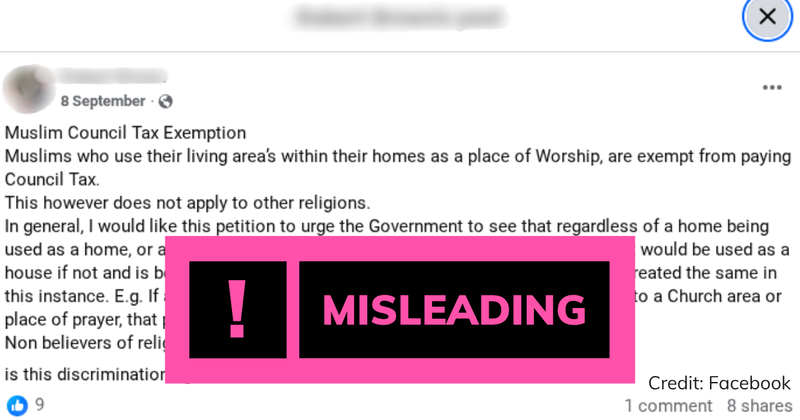Claims that Muslims are exempt from paying council tax if living areas within their home are used as a place of worship are circulating again on social media.
As we’ve explained before, it’s not true that Muslims, or members of any other religion, can avoid paying council tax on domestic properties altogether if a room is set aside for prayer.
Similar misleading claims have been spreading online for over a decade.
We’ve spotted various posts on Facebook and on X making the claim in recent months.
And one version of the claim we saw from earlier this year is a screenshot of what appears to be a Google search result for a question about Muslims and council tax. It takes a line from a petition on the Parliament.uk website which says: “Muslims who use their living area’s within their homes as a place of Worship, are exempt from paying Council Tax [sic]”.
The part of the petition making this claim, however, is not affiliated with the Houses of Parliament and was written by the individual who created it in 2013. This petition has a box at the top which warns readers that it has been “identified as misleading” and links to one of our previous fact checks on this subject.
The House of Commons Library says that such claims “have no basis in council tax law”. It said in a 2024 report: “It is not possible for owners of domestic property to avoid council tax by claiming that their property, or part of it, is used for religious purposes.”
The only exemption or discount related to religion set out in council tax law is for members of religious communities, “the principal occupation of which consists of prayer, contemplation, education, the relief of suffering” with “no income or capital” of their own who are “dependent on the community” to provide for their “material needs”. For example, some nuns may fall within this category.
Council tax is paid on homes, while non-domestic properties pay business rates.
Buildings registered for public religious worship or church halls may be exempt from business rates, though some parts of a religious premises may fall outside the exemption if they are not being used for religious worship.
According to the House of Commons Library: “It would be theoretically possible for part of a domestic property which was used for public religious purposes to be separately valued for business rates, and to be removed from the council tax valuation list.
“However, the VOA [the Valuation Office Agency, which is responsible for assessing properties for council tax and business rates in England and Wales] would have to be satisfied that this reflected the real use of the property. Such a change would be unlikely to make more than a minimal difference to the council tax bill on the remainder of the property.”
Gary Watson, chief executive of the Institute of Revenues, Rating & Valuation (IRRV), told Full Fact “there are no exemptions in relation to religion in respect of council tax” while the Local Government Association also confirmed it is not possible for owners of domestic property to avoid council tax by claiming that their property, or part of it, is used for religious purposes.
Full Fact asked Google about its misleading responses to questions about Muslims and council tax, and was told search results are a reflection of the content publicly available on the web.
We’ve previously fact checked similar misleading claims about tax or charge exemptions for members of particular religions, including about stamp duty exemptions for “sharia-compliant mortgages” and ULEZ exemptions for journeys to places of worship.
Full disclosure: Full Fact has received funding from Google and Google.org, Google’s charitable foundation. You can read more about our funding here. We are editorially independent and our funders have no editorial control over our content.
